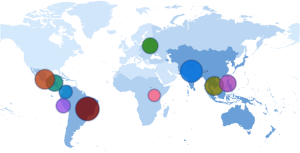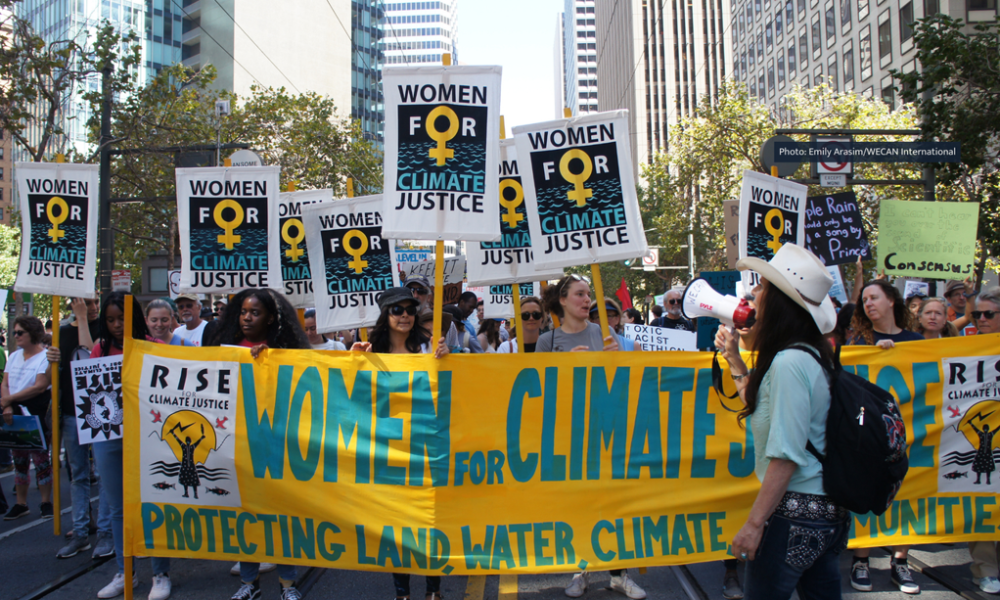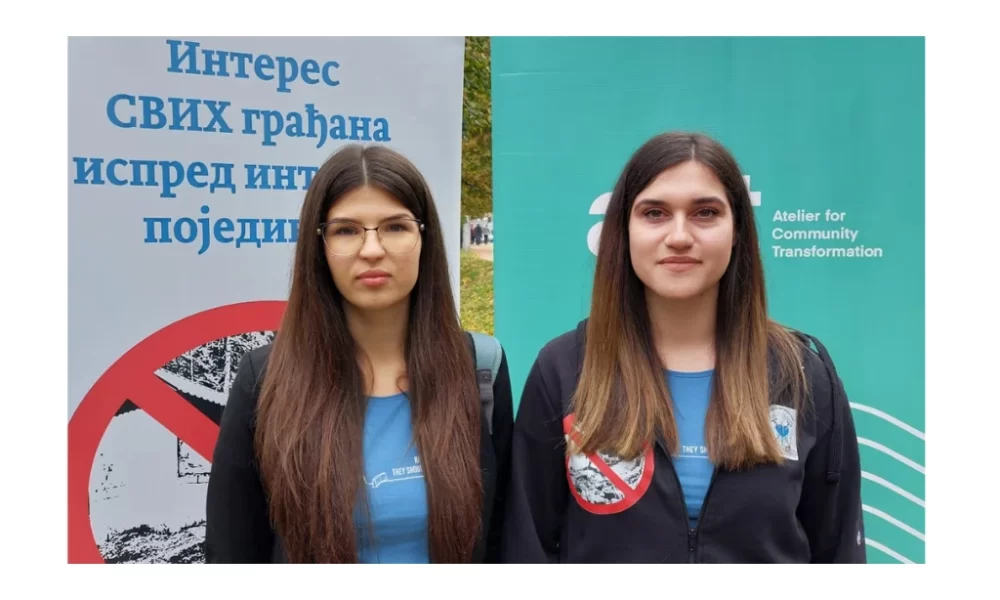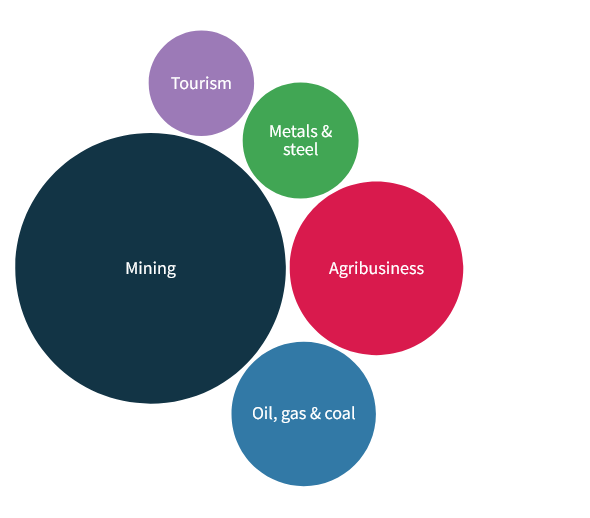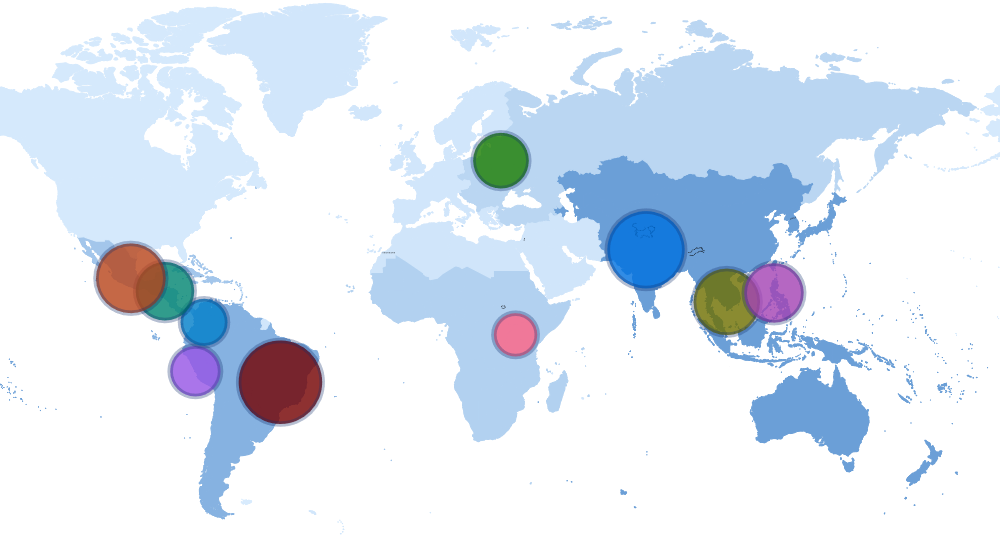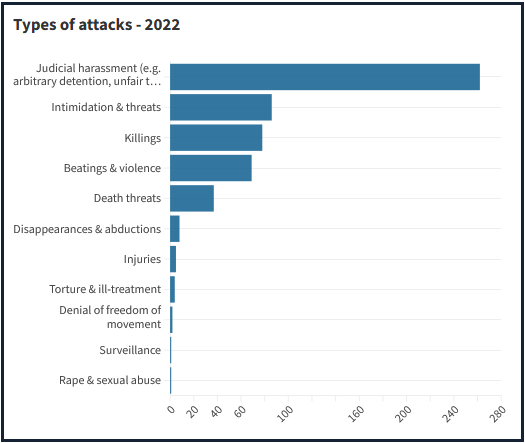NGO WORK
Human rights defenders & business in 2022: People challenging corporate power to protect our planet.
Published
2 years agoon
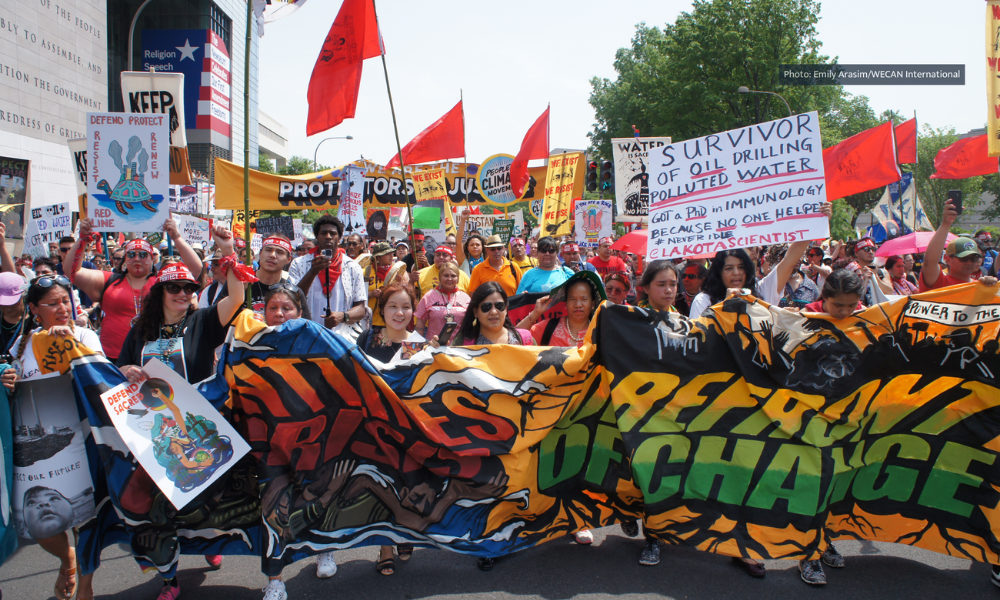
“All over the world the positive achievements of human rights defenders too often go unrecognised. Defenders are targeted because they confront powerful vested interests by protecting our natural resources and shared climate, defending labour rights, exposing corruption, and refusing to accept injustice. As we mark the 25th anniversary of the Declaration on Human Rights Defenders, States can and should do more to protect defenders, including by passing mandatory human rights and environmental due diligence legislation that requires businesses to engage in ongoing, meaningful engagement with defenders and other stakeholders.
– Mary Lawlor, UN Special Rapporteur on the situation of Human Rights Defenders
Every day, people across the globe are taking action to protect their communities, environments, and livelihoods from irresponsible business practice and demanding that companies uphold their responsibility to respect human rights, sometimes at great personal cost. Our data tracking attacks against these human rights defenders reveals the majority are against people raising concerns about harm to our shared environment.
This includes community members using direct action to stop logging in conservation areas in Malaysia, Indigenous leaders in Mexico protecting rivers and local biodiversity from harms caused by hydroelectric projects, and journalists reporting on environmental pollution in Serbia.
Despite the significant challenges they face, defenders are achieving victories worldwide. In 2022 defenders in Sierra Leone successfully advocated for a new law protecting customary land rights and banning industrial development in protected and ecologically sensitive areas; environmental justice groups in Louisiana’s “cancer alley” in the United States halted two large petrochemical projects; garment workers in Pakistan’s Sindh province won a 40% increase in minimum wage; women human rights defenders were elected to senior political positions in Brazil and Colombia, and after years of advocacy by Indigenous women leaders and organisations, the Committee on the Elimination of Discrimination Against Women adopted General Recommendation 39 on Indigenous Women and Girls – the first language in a binding international treaty focused on the rights of Indigenous women and girls.
As we mark the 25th anniversary of the Declaration on Human Rights Defenders, we celebrate the courage, creativity, and commitment of these people, organisations, and communities across the globe who are protecting our rights and shared planet.
Yet, human rights defenders continue to face intolerable levels of risk and harm. In their vital work to promote human rights and protect the environment, they confront powerful actors and interests. They raise concerns about companies and investors engaged in irresponsible practice, governments failing in their duty to protect human rights, and other non-state actors profiting from environmental destruction. They do this work in increasingly restrictive environments, where anti-protest, terrorism, defamation, and “foreign agent” laws are used to silence dissent. According to CIVICUS, 2022 was marked by a serious decline in civic space, with only 3% of the world’s population living in countries with open civic space, where the freedoms of peaceful assembly, association, and expression are respected.
The scale of lethal and non-lethal attacks against people defending our rights, natural resources, and environment from business-related harms shows the failure of governments to protect human rights and that voluntary action by companies and investors is insufficient to prevent, stop, and remedy harm. It reinforces the need for mandatory human rights and environmental due diligence legislation grounded in safe, ongoing and effective rights-holder engagement, respect for the process of free, prior and informed consent (FPIC) of Indigenous peoples, and strong safeguards for human rights defenders, as well as further government action to protect the people who are at the forefront of protecting our planet.
Scope & scale of attacks
Alexandros Michailidis, Shutterstock
Between January 2015 – March 2023, the Business & Human Rights Resource Centre tracked more than 4,700 attacks against human rights defenders raising concerns about harmful business practice. In 2022 alone, we tracked 555 attacks, revealing that on average more than 10 defenders were attacked every single week for raising legitimate concerns about irresponsible business activity. Three-quarters of attacks (75%) were against climate, land and environmental defenders. Over a fifth of attacks (23%) were against Indigenous defenders, who are protecting over 80% of the world’s remaining biodiversity, although they comprise approximately 6% of the global population.
This is just the tip of the iceberg. Our research is based on publicly available information and as many attacks, especially non-lethal attacks (including death threats, judicial harassment and physical violence), never make it to media sources and there is a significant gap in government monitoring of attacks, the problem is even more severe than these figures indicate.
Global picture
Attacks against human rights and environmental defenders occur in every region of the world. Since we began tracking in 2015, Latin America and Asia and the Pacific have consistently been the most dangerous regions for defenders.
In 2022, the highest number of attacks on defenders raising concerns about business-related harms occurred in Brazil (63 recorded incidents of attack, affecting one or more defender), India (54), Mexico (44), Cambodia (40), the Philippines (32), Honduras (31), Belarus (28), Peru (23), Colombia (20), and Uganda (17). Learn more about our research methodology.
Types of attacks
Defenders are subjected to a range of attacks, including both killings and non-lethal attacks, such as threats, smear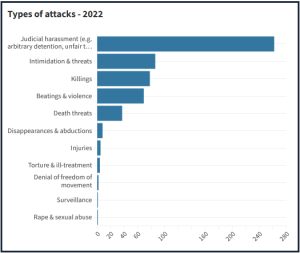 campaigns, arbitrary arrest, strategic lawsuits against public participation (SLAPPs), and physical and sexual violence. Most (86%) of the attacks we tracked in 2022 were non-lethal, which are often precursors to lethal violence and warning signs to States to increase protection efforts.
campaigns, arbitrary arrest, strategic lawsuits against public participation (SLAPPs), and physical and sexual violence. Most (86%) of the attacks we tracked in 2022 were non-lethal, which are often precursors to lethal violence and warning signs to States to increase protection efforts.
Non-lethal attacks are generally left uninvestigated and unpunished, which can have a chilling effect on the work of defenders and promote impunity that feeds further violence where defenders persist in their critical work. The Esperanza Protocol, launched in December 2021 by civil society organisations and experts in international law, provides guidelines based on international human rights law to support the investigation, prosecution and punishment of threats against defenders by governments and ultimately create an enabling environment for the defence of human rights worldwide. While the protocol largely focuses on the duty of States, it also notes business actors must ensure their activities, actions, and omissions do not lead to threats against defenders and address any harms to defender
Peru
Oscar Mollohuanca Cruz was a former mayor of the Espinar district in Peru and a human rights and environmental defender. In 2012, alongside other community members, he raised concerns about environmental contamination and harm to human health related to copper mining in the region.
In 2016, along with two other defenders, he was criminally indicted on charges of endangering public safety, obstruction of public services and disturbing the peace related to his activism and the protests in 2012. The three defenders faced eight years in jail for the first two charges and seven for the third one, in addition to fines of 27,000 EUR (100.000 soles). They were acquitted on 17 July 2017, however on 10 May 2018, the First Criminal Appeals Chamber of the Ica High Court of Justice overturned the acquittal and ordered the trial to be initiated once again.
In November 2021, Oscar participated in the National Campaign of Environmental Defenders in Peru where he shared his concerns about the lack of protection of defenders in the country and the urgent need for protecting the right to defend human rights. On 7 March 2022, Oscar was found dead with injuries on his body.
Judicial harassment
Many governments are not only failing in their duty to protect human rights but also actively targeting defenders through their legal systems or facilitating use of these systems by private actors to target defenders. Judicial harassment, which includes arbitrary detention, unfair trials, and other forms of criminalisation, continues to be prevalent worldwide. It also includes strategic lawsuits against public participation (SLAPPs), lawsuits initiated or brought by business actors against people and groups for exercising their rights to participate in, comment on, or criticise matters of public concern. Judicial harassment causes significant stress and harm to defenders and diverts time away from their human rights work while draining their resources. It can have a chilling effect, deterring others from speaking out against abuse. Jointly, these forms of judicial harassment comprised nearly half (47%) of the cases we tracked in 2022 and 51% of cases since 2015.
Bosnia & Herzegovina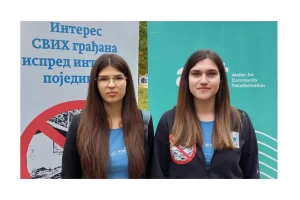
Sunčica Kovačević and Sara Tuševljak are 25-year-old law students who formed a group comprised of local community members and activists organizing against the construction of small hydropower plants in the Kasindolska river in East Sarajevo, Bosnia and Herzegovina. This initiative raised concerns about the environmental and human rights impacts of hydropower plants operated by BUK d.o.o, a subsidiary of Belgian-based company Green Invest. In January 2022, Green Invest brought three defamation lawsuits, which bear the hallmarks of SLAPPs, against Sunčica and Sara and they have been threatened with further legal action.
The Resource Centre sought a response from Green Invest, which stated the lawsuits were filed to stop the defamation against the company. A rejoinder from Riverwatch, EuroNatur, Foundation Atelier for Community Transformation – ACT, Save the Blue Heart of Europe, and Stop Building Small Hydropower Plants on Kasindolska River expressed support for the defenders.
ACT – Foundation for social change
Gendered nature of attacks
During 2022, nearly one-quarter of attacks were against women human rights defenders. While defenders of all genders are targeted due to their human rights work, women human rights defenders challenging both corporate power and patriarchal gender norms often endure specifically gendered attacks. This includes online threats and harassment of a sexualised nature and smear campaigns criticising women for spending time on activism rather than caretaking in the home. In research by the SAGE Fund about women defending their lands, territories, resources and the climate from extractive projects, many women interviewed said the psychological harm from online smear campaigns was one of the most significant and long-term forms of structural harm they face.
These tactics are meant to stigmatise, isolate and silence women defenders. Due to patriarchal power dynamics, women human rights defenders often also face risks in different spheres, including in their societies, communities and families. They may experience discrimination or violence in the movements and organisations they work with, criticism from their families or communities for their human rights work, and intimate partner violence at home. While defenders of any gender face barriers to justice and remedy, these difficulties are compounded for women human rights defenders due to gender-based discrimination and violence, and even more challenging for women facing multiple forms of discrimination on the basis of race, ethnicity, ability and other identities.
Sector overview
Attacks against defenders occur in relation to almost every business sector in every region of the world. The four most dangerous sectors in 2022 related to natural resources. Short term profit-driven extractive approaches which have underpinned the global energy model are core drivers of attacks on defenders and have not provided many of the economic benefits or development promised to communities and countries.
Mining has consistently been the most dangerous sector for defenders since we began tracking in 2015, showing little progress to prevent attacks. Nearly 30% of attacks in 2022 were connected to mining, and the sector is even more dangerous for Indigenous defenders – 41% of attacks against Indigenous peoples in 2022 related to mining.
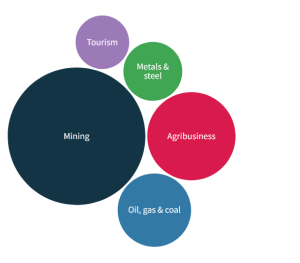
This is particularly concerning given that International Energy Association projections point to a six-fold increase in demand for transition minerals (e.g., copper, cobalt, lithium, nickel, manganese, zinc, as covered in our Transition Minerals Tracker, as well as rare earths) by 2040. In addition, a 2022 study found that half of the world’s resource base for crucial energy transition materials is located on or near Indigenous Peoples’ lands. Lithium mining is of particular concern: according to the study, 85% of current and planned lithium extraction projects are located on or near land managed or inhabited by Indigenous peoples.
Mining for transition minerals, as well as land-intensive renewable energy projects, are already causing widespread abuse of land, water and Indigenous peoples’ rights. Our Transition Minerals Tracker revealed the world’s biggest producers of six key minerals needed for the zero-carbon transition are largely failing to address risks and impacts on local communities, including attacks on civil society organisations and their leaders. This approach to the transition will also continue to fuel opposition, conflict, and result in delays to both projects and achieving our global climate targets. Such conflict has already resulted in at least 369 attacks on defenders related to renewable energy projects since 2015, including 98 killings. In addition, we have tracked at least 148 attacks related to transition mineral mining between 2010 and 2021, making up over a quarter of the 517 attacks recorded with links to renewable energy value chains – from mineral extraction through to installations.
Despite these risks, human rights and environmental defenders are at the forefront of advocating for a rights-respecting, more sustainable energy transition which does not replicate harmful extractive models of past and present. They are also innovating and reimagining the energy sector based on equity. We are seeing a small, but growing, adoption of equity model frameworks where renewable energy companies design projects with Indigenous communities based on the principles of co-ownership and sustainable shared benefit, which is essential for a rights-based and sustainable transition.
Perpetrators of attacks
As many attacks involve collusion between State, private sector and other non-state actors in contexts with high levels of impunity, perpetrators are often difficult to identify. In cases where attacks could be connected with a specific company or a business project (43% of total attacks in 2022), the highest number of attacks related to companies headquartered in India and the United Arab Emirates. Both countries have tried to position themselves as global and environmental leaders and are hosting major multilateral events in 2023 – G20 and COP28, respectively. In addition, Brazil, set to host the G20 presidency in 2024, is the most dangerous country overall for defenders raising concerns about business. This worryingly signals that the countries charged with steering collective action on climate and global economic and financial stability are failing in their duty to protect human rights and to hold companies headquartered in their countries to account when they violate the rights of defenders.
The five companies whose operations, value chains, or business relationships were connected to the highest numbers of attacks in 2022 were JSW Steel Ltd. (India), Otterlo Business Corporation (UAE), TotalEnergies (France, East African Crude Oil Pipeline majority shareholder), Inversiones los Pinares (Honduras), and NagaCorp Ltd and its subsidiary NagaWorld (Cambodia) (more information about the allegations can be downloaded here). These include any attacks against defenders raising human rights concerns about these companies’ operations, value chains, or business relationships, even if the company did not perpetrate the attack directly.
We invited these companies to respond. JSW Steel Ltd. and TotalEnergies responded; their full responses are available here. Otterlo Business Corporation, Inversiones los Pinares, and NagaCorp did not respond.
There are many ways companies can be involved with attacks on defenders, including:
- Calling police or state security forces to disperse a peaceful protest at one of their operation sites;
- Threatening, firing or calling for the arrest of union leaders;
- Cooperating with state repression, such as by providing services or products that enable surveillance of journalists and other defenders; and
- Initiating lawsuits against defenders for defamation, damages or incitement to commit a felony; and
- Lobbying for policies that restrict civic freedoms, such as “anti-protest” laws and actions that lead to criminalisation of defenders.
Less obvious tactics to silence defenders and undermine their rights include providing incentives for some community members to create divisions, obstructing unionisation, disseminating distorted information about projects, lobbying against regulation intended to protect human rights and the environment, and exploiting governance gaps for corporate benefit, among others.
According to the UN Guiding Principles on Business and Human Rights and subsequent guidance, if business actors are causing or contributing human rights abuse affecting defenders, their responsibility is clear-cut: end the abuse and address and remedy any harm. Even in cases where there are no apparent direct links between companies or investors and attacks, business actors with operations, supply chains, business relationships and/or investments are expected to proactively use their leverage to promote respect for the rights of defenders and civic freedoms. In addition, restrictions on civic freedoms signal riskier contexts for investment and economic activity and create an “information black box” for companies and investors, making it more difficult to engage in robust human rights due diligence.
Other non-state actors involved with attacks on defenders include illegal miners, loggers and organised criminal groups. Illegal mining and logging – extraction of these natural resources undertaken without appropriate land rights, exploration licenses or transportation and other permits – are often associated with significant human rights abuses, environmental harm and corruption. Lack of transparency in precious metal supply chains, weak regulation in both producing and consumer countries, the potential for significant profit, and high levels of impunity fuel exploitation in this sector.
People who raise concerns about illegal mining and logging are protecting their land, clean water, and biodiversity; combating pollution and deforestation; and helping to address the climate crisis. They often face threats and violence from those involved with this illegal exploitation of resources. While companies are not direct perpetrators of these attacks, these illegally extracted resources often end up in their supply chains, showing a need for stronger human rights due diligence among sourcing companies.
State actors
Among the cases we tracked where information was publicly available about alleged perpetrators of attacks, the police were named most frequently, followed by the judicial system. The data we uncovered shows how governments are failing in their duty to protect rights and, further, are actively using agents and arms of the State – police, armed forces and the judicial system – to try to silence and stop human rights and environmental protection work. According to the UN Working Group on Business and Human Rights, governments have a duty to investigate, punish and redress all forms of threats and attacks against human rights defenders in a business context, yet many have a vested interest in these attacks happening under the radar given their involvement. In addition, very few States are collecting official data on lethal and non-lethal attacks.
Advances in legislation and voluntary commitments
Over the past two years, there have been several significant developments related to business and human rights defenders in both soft and hard law, driven by years of civil society advocacy. In 2021, the seminal interpretation of UNGPs by the UN Working Group on Business and Human Rights clarified the normative responsibility of business actors to respect the rights of defenders and highlighted the critical role played by defenders in human rights due diligence processes and in enabling business enterprises to understand the concerns of affected stakeholders. In addition, the Escazú Agreement – the first legally binding instrument in the world to include provisions on environmental human rights defenders and the first environmental agreement adopted in Latin America and the Caribbean – entered into force.
Milestones in 2022 and 2023 include:
- Adoption of General Recommendation 39 on Indigenous Women and Girls by the Committee on the Elimination of Discrimination Against Women – the first language in a binding international treaty focused on the rights of Indigenous Women and Girls. The recommendation also acknowledges that Indigenous women and girls are at the forefront of demand and action for a clean, safe, healthy and sustainable environment.
- Inclusion of strengthened stakeholder consultation requirements and the language of human rights defenders in the European Union corporate sustainability due diligence legislation text approved by the European Parliament’s Committee on Legal Affairs (JURI) on 25 April 2023, making it more likely that the final text of this historic corporate accountability legislation could include requirements related to defenders. At the same time, the language in the JURI committee’s position is in some ways weaker than the text proposed by lead MEP Lara Wolters in her earlier draft report. The EU Council’s General Approach adopted by Member States on 1 December 2022 also includes language on defenders and explicitly mentions them as stakeholders whose rights or interests could be affected by corporate activity.
- Appointment of former UN Special Rapporteur on Human Rights Defender Michel Forst as the first-ever Special Rapporteur on Environmental Defenders under the Aarhus Convention, which protects the right to live in a healthy environment in the European Union. This is the first such mechanism specifically safeguarding environmental defenders to be established within a legally binding framework either under a UN system or other intergovernmental structure.
- Consultations on the revision of the OECD Guidelines on Multinational Enterprises, in which civil society groups have urged strengthening the text on reprisals and explicitly including “human rights defenders”.
- Several corporate and government commitments to the protection of civic space and human rights defenders as part of the US Summit for Democracy.
These and other developments signal momentum towards recognition of the need to prevent and address attacks against defenders raising concerns about business-related harms, including among companies themselves. For example, Hewlett Packard Enterprises enacted a policy commitment to respect the rights of marginalised groups (including defenders) in January 2022, and TotalEnergies published information about the actions it has taken with respect to human rights defenders and freedom of expression in Uganda (see also TotalEnergies EP Uganda’s human rights policy). In addition, the Voluntary Principles Initiative, a multi-stakeholder initiative that guides oil, gas and mining companies on how to conduct their security operations in a manner that respects human rights, will release guidance on defenders in 2023.
Recommendations
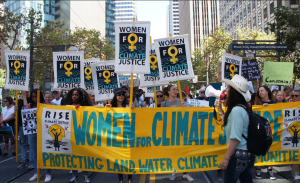
The scale and severity of attacks on people across the globe protecting our rights and environment clearly show the need for urgent action. We call on States to fulfil their duty to protect the rights of defenders and for business actors to respect the rights of defenders by acting on these recommendations.
Recommendations for states
- Pass and implement legislation recognising the right to defend rights and the vital role of defenders, both individual and collective, in promoting human rights, sustainable development, and a healthy environment and committing to zero-tolerance for attacks (more detail recommendations available here). This must include legal recognition of the specific rights of Indigenous and Afro-descendant peoples (more detailed recommendations available here).
- Accede to or, if already ratified, fully implement key international and regional standards that protect the civic freedoms of defenders, including those raising concerns about harmful business practice.
- Pass national laws to implement the UNGPs, including mandatory human rights due diligence legislation, and consult with defenders at all stages of this process. This legislation should mandate that business actors engage in ongoing safe and effective consultation with defenders and other rightsholders potentially or directly affected, should be an integral part of climate mitigation and adaptation plans, and should be aligned with the UN working group’s guidance on defenders and other key standards mentioned above (more detailed recommendations available here).
- Collect and report data on non-lethal and lethal attacks to inform more effective protection mechanisms and passing anti-SLAPP legislation to prevent companies silencing defenders (more detailed recommendations available here).
- Ensure effective remedy for violations when they occur, including by strengthening judicial systems to hold businesses accountable for acts of retaliation against defenders and actively participating in investigation and prosecution of those responsible for attacks.
- Move towards supporting the adoption of a binding United Nations treaty on business and human rights and ensure that it explicitly recognises the risks defenders face and their right to defend human rights.
Recommendations for companies
- Adopt and implement policy commitments which recognise the valuable role of defenders, reference specific risks to defenders, ensure effective engagement and consultation with defenders at all stages of the due diligence process and commit to zero-tolerance for reprisals throughout the company’s operations, supply chains and business relationships.
- Create public commitments to respect fundamental rights with particular attention to rights often abused in connection with attacks on defenders, such as violations of land and Indigenous peoples’ rights.
- Engage in and report on the results of human rights and environmental due diligence that integrates a gender perspective throughout and ensure effective access to remedy for those harmed by business activity, in accordance with the UNGPs, the UN Working Group’s guidance on ensuring respect for defenders, and the UN Working Group’s gender guidance.
- Recognise that Indigenous defenders are disproportionately at risk, respect Indigenous peoples’ rights, grounded in their rights to self-determination; lands, territories, and resources; and right to free, prior, and informed consent, including their right to define the process by which FPIC is achieved and to withhold consent (more detailed recommendations available here).
- Publicly recognise that defenders have a right to defend human rights, are essential allies in assisting businesses to adhere to their responsibilities under the UNGPs.
Recommendations for investors
- Publish a public human rights policy which recognises the valuable role of defenders in identifying risks associated with business activities and commits to a zero-tolerance approach to attacks against defenders. Clearly communicate the human rights expectations included in this policy to portfolio companies, including that companies:
‣ disclose human rights and environment-related risks;
‣ engage in ongoing consultation with communities, workers and defenders;
‣ have policies and processes to respect Indigenous peoples’ rights (including land rights and free, prior and informed consent);
‣ respect the rights of defenders; and
‣ ensure effective access to remedy when harm occurs. - Undertake rigorous human rights and environmental due diligence that integrates a gender perspective throughout and review potential investees for any past involvement with retaliation. Avoid investing in companies with this track record.
- Use leverage with investee companies which cause, contribute to, or are directly linked to human rights and environmental harms, including attacks on defenders, so that the company mitigates negative impacts and provides access to remedy to those affected.
Related posts:
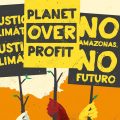
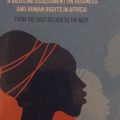 United Nations Guiding Principles on Business and Human Rights (UNGPs10+) have been released in Accra, Ghana.
United Nations Guiding Principles on Business and Human Rights (UNGPs10+) have been released in Accra, Ghana.
 Human rights defenders show remarkable courage in the face of attacks and killings – new report
Human rights defenders show remarkable courage in the face of attacks and killings – new report
 #COP27: HUMAN RIGHTS ADVOCATES URGE PARTIES TO INCREASE RECOGNITION AND PROTECTION OF ENVIRONMENTAL AND LAND DEFENDERS.
#COP27: HUMAN RIGHTS ADVOCATES URGE PARTIES TO INCREASE RECOGNITION AND PROTECTION OF ENVIRONMENTAL AND LAND DEFENDERS.
 Human Rights Defenders not safe in Uganda – Unwanted Witness report
Human Rights Defenders not safe in Uganda – Unwanted Witness report
You may like
NGO WORK
Communities Under Siege: New Report Reveals World Bank Failures in Safeguard Compliance and Human Rights Oversight in Tanzania
Published
2 weeks agoon
July 2, 2025
Villagers living in the shadow of Ruaha National Park (RUNAPA) are under siege from a rogue –World Bank-funded paramilitary ranger force. Accountability Now – Tanzanian Communities Shattered by World Bank-funded Tourism Project, a new Oakland Institute report, shines a spotlight on the human toll of the Bank’s ongoing failure to correct the dire crisis it has created.
As previously exposed by the Institute, the Resilient Natural Resource Management for Tourism and Growth (REGROW) project enabled the violent expansion of RUNAPA in Tanzania, resulting in grave human rights abuses, devastation of livelihoods, and planned widespread evictions. These damning findings were confirmed by the Bank’s own Inspection Panel in its September 2024 investigation report. Accountability Now details the severely delayed and deficient action taken by the Bank in response to the blatant violation of its safeguards, which has allowed the cycle of violence and suffering to persist.
“This report is not only a scathing indictment of the Bank’s irresponsible financing and mishandling of the case, but also of the institution’s absence of accountability given its failure to correct its wrongs at every step. The Bank’s management admitted its responsibility for enabling this crisis – and yet, it has turned its back on villagers as human rights abuses and crippling livelihood restrictions continue unabated,” said Anuradha Mittal, Executive Director of the Oakland Institute.
The report documents how the Bank’s funding allowed the government to double the size of RUNAPA by over one million hectares through Government Notice 754 in October 2023 without the consent of those living on this land. This placed over 84,000 people from at least 28 villages at the risk of imminent eviction and resulted in over US$70 million of economic losses for farmers and pastoralists – suffering compounded by killings and violence at the hands of rangers funded by the Bank.
Between 2017-2024, the Tanzania National Parks Authority (TANAPA) rangers were equipped and emboldened by the World Bank, enabling the agency to carry out a brutal campaign against local residents. Communities have endured extrajudicial killings, enforced disappearances, torture, and sustained economic hardship – made possible by the Bank’s lack of oversight.
The World Bank-financed REGROW project was officially cancelled on November 6, 2024. On April 1, 2025, the Bank’s Board of Directors approved an Action Plan (MAP) to address the findings of the Inspection Panel’s investigation into the project. Instead of remedying the harms identified by the Panel and responding to the demands of the impacted communities, the MAP chose to narrowly focus on alternative livelihoods and accepted the government’s dubious promise that villages consumed by the park would not be resettled and residents could continue grazing, fishing, and farming.
Barely a month later, on April 26, 2025, 27-year-old fisherman Hamprey Mhaki disappeared after being shot by rangers in the Ihefu Basin. On May 7, rangers opened fire on herders in Iyala village, killing 20-year-old Kulwa Igembe, and seizing over 1,000 cattle in another devastating economic blow to herders.
The World Bank made a commitment to work with the Tanzanian government to “support communities in and around RUNAPA in an effort to balance conservation and development, including reducing incidences of conflict and violence in the Park and providing alternative livelihoods.” The latest killings, cattle seizures, and farming restrictions, expose the hollowness of the Bank’s commitment. Several villages have been instructed to relocate – directly contradicting the government’s prior assurances. Though it claims to be supervising the implementation of the MAP, the Bank’s management has entrusted the very government responsible for the violence to investigate it.
“If the core promise to allow daily life to resume for the villagers is not honored, their very survival is at risk. Impacted communities expected the Bank to supervise the MAP. They are appalled by the Bank’s response that the perpetrators of violence will provide them with justice. Given the Tanzanian government’s horrific record of human rights abuses, this is akin to letting the fox guard the henhouse,” Mittal concluded.
The time to deliver redress is long overdue. One impacted villager said, “We are crying for our lands…let us be free. We don’t want to leave and the World Bank should stop the government from taking our lands. Our suffering is directly because of the Bank. Let us be free.”
Source: oaklandinstitute.org
Related posts:

 The World Bank Must Be Held Accountable for Harm Inflicted on Tanzanian Communities by Tourism Project
The World Bank Must Be Held Accountable for Harm Inflicted on Tanzanian Communities by Tourism Project
 World Bank Project Cancelled in a Landmark Victory for Tanzanian Villagers
World Bank Project Cancelled in a Landmark Victory for Tanzanian Villagers
NGO WORK
World Bank-Funded TANAPA Rangers Murder Two Villagers in Ruaha National Park
Published
2 months agoon
May 22, 2025In the last two weeks, TANAPA rangers have killed two villagers within the disputed boundaries of the Ruaha National Park in Tanzania. These murders shatter promises made just a month ago by the Tanzanian government and the World Bank to end ranger violence and allow livelihood activities to continue within the park.
On April 26, 2025, six fishermen were confronted by rangers outside of Mwanjurwa, near Ikanutwa and Nyeregete villages in the Ihefu Basin. As they tried to escape, rangers shot 27-year-old Hamprey Mhaki in the back. It is believed that Mr. Mhaki succumbed to his gunshot wound, as the search party only found a large amount of blood where he was last seen. He remains missing – while his pregnant wife and grieving family search for answers and demand justice.

In another incident, on May 7, 2025, a group of herders and their cattle in the Udunguzi sub-village of Iyala village were attacked by a TANAPA helicopter that opened fire with live ammunition. Eyewitnesses report that Kulwa Igembe, a 20-year-old Sukuma herder, was shot in the chest by one of the rangers on the ground. He died at the scene. Mr. Igembe is survived by his widow and young daughter.
According to Tanzanian media, four TANAPA rangers are being held by the Mbeya Regional Police Force for their involvement in Mr. Igembe’s killing. His body remains at the Mochwari Mission hospital, as his family has refused to proceed with burial until authorities conduct a full and transparent investigation. Furthermore, local sources state that over 1,000 cattle belonging to several herders were seized and impounded at the Madundasi ranger post following the attack. About 500 cattle have been reclaimed after herders paid TSh100,000 per head [US$37] in fines – delivering a substantial financial blow.
The Bank’s REGROW project, now cancelled, built the enforcement capacity of the rangers who committed these murders. In the 2024 investigation by its Inspection Panel, the Bank conceded that by “enhancing TANAPA’s capacity to enforce the law,” the project “increased the possibility of violent confrontations” between rangers and villagers. The Panel found the Bank to have failed to adequately supervise TANAPA and ignored rangers use of “excessive force,” in violation of international standards. Already over the course of the REGROW project, at least 11 individuals were killed by police or rangers, five disappeared, and dozens suffered physical and psychological harm, including torture and sexual violence.
“The murders of Mr. Igembe and Mr. Mhaki make it painfully clear that the Tanzanian government has no intent to end atrocities against local communities for tourist revenue. These brutal actions not only constitute abject crimes but are also a blatant violation of the commitments the government made to the World Bank,” said Anuradha Mittal, Executive Director of the Oakland Institute. “The Bank created a monster in TANAPA and must be held accountable along with the rogue ranger force,” Mittal added.
In its April 2, 2025 press release, the World Bank stated that “The Government of Tanzania has committed to implementing the MAP [Management Action Plan], and the World Bank will support and supervise its implementation.” The Action Plan is based on the premise that the government will honor its now broken promise that there will be no resettlement and villagers can continue their livelihood activities, like grazing and fishing. Iyala village, where Mr. Igembe was killed, is one of the five villages consumed by the October 2023 expansion of Ruaha National Park.
The Bank also committed to addressing violence by TANAPA rangers through a grievance mechanism and trainings on “relevant good international practice in protected area management.” Unfortunately, the Oakland Institute’s warning to the Bank’s officials, that given the extent of TANAPA’s human rights abuses, these measures would fail in preventing future harms, has come true.
“The violence hasn’t stopped. Villagers are being killed, their cattle stolen, their lives destroyed. Local communities are desperate for the world to listen. The Oakland Institute joins them in demanding that the World Bank take responsibility and act now. Every day of silence costs lives. The victims and their families deserve justice, truth, and the chance to live without fear,” concluded Mittal.
Source:The Oakland Institute
Related posts:

 The World Bank Must Be Held Accountable for Harm Inflicted on Tanzanian Communities by Tourism Project
The World Bank Must Be Held Accountable for Harm Inflicted on Tanzanian Communities by Tourism Project
 Campaign Victory: World Bank Suspends Funding for REGROW, a Conservation Project Responsible for Evictions & Human Rights Abuses in Tanzania
Campaign Victory: World Bank Suspends Funding for REGROW, a Conservation Project Responsible for Evictions & Human Rights Abuses in Tanzania
 URGENT ALERT: Tanzanian Government on a Rampage Against Indigenous People
URGENT ALERT: Tanzanian Government on a Rampage Against Indigenous People
NGO WORK
Defending rights and realising just economies: Human rights defenders and business (2015-2024)
Published
2 months agoon
May 22, 2025
Over the past decade, human rights defenders (HRDs) have courageously organised to stop corporate abuse and prevent business activities from causing harm – exposing human rights and environmental violations, demanding accountability, and advocating for rights-respecting economic practices. From Indigenous Peoples protecting forests from mining activities to journalists exposing health and environmental harms related to logging to workers advocating for better conditions in the garment sector, HRDs are at the forefront of creating a more equitable, sustainable and abundant world where rights are protected, people and nature thrive, and just economies can flourish.
Every one of us has the right to take action to protect our rights and environments and contribute to creating a more just and equitable world, and yet those who do often face great risk. Businesses have the responsibility to respect human rights, including the right of all people to defend human rights. When companies fail to listen to HRDs, they lose important allies – people and groups fighting for transparency and accountability, and against corruption, which are all essential elements of an open and stable business operating environment. With authoritarianism on the rise, the imperative of realising a just global energy transition, and deepening inequality around the world, the role of business has rarely been so important – especially as HRDs pressing for rights-respecting corporate practice face increasing challenges.
From January 2015 to December 2024, the Business & Human Rights Resource Centre (the Resource Centre) recorded more than 6,400 attacks across 147 countries against people who voiced concerns about business-related risks or harms. This is close to two attacks on average every day over the past ten years. In 2024 alone, we tracked 660 attacks.

Civic space – the environment that enables all of us to organise, participate, and communicate freely in our societies – has also continued to deteriorate over the past decade. According to Civicus, only 3.6% of the world’s population currently lives in countries with open civic space, where citizens and civil society organisations are able to organise, participate and communicate without restrictions. In every region, governments have abused their power to limit the civic freedoms of people advocating for responsible business practice by detaining journalists, passing restrictive legislation (such as foreign funding bills and critical infrastructure laws), criminalising and prosecuting HRDs, and using violent force at protests, among other actions.
This is harmful for business. Civic space restrictions create an ‘information black box,’ leaving companies and investors with gaps in knowledge about potential or actual negative human rights impacts, which can lead to legal, financial, reputational and other risks. Democracy and full enjoyment of civic freedoms are central to addressing the key challenges humanity faces and to sustainable economic growth – some economists have found that democratisation causes an increase in GDP per capita of between 20% and 25%. In addition, under the UN Guiding Principles on Business and Human Rights (UNGPs) and subsequent guidance, business actors also have a responsibility to respect human rights, which includes engaging in robust human rights due diligence that identifies and mitigates risks to civic freedoms and HRDs.
In our current context of continued erosion of democracy, deregulation, backlash against environmental, social and governance (ESG) concerns, increased conflict, and the weaponsation of both law and technology against human rights defence, HRDs remind us to transcend polarisation and persist in realising a more just and abundant future for us all. Key wins over the past decade include a legally binding instrument to protect environmental defenders, regulations to curb strategic lawsuits against public participation, and important victories advancing corporate accountability following advocacy and judicial efforts. Representatives from Indigenous communities have shared a powerful vision for a rights-respecting energy transition – an essential framework for the future. They are innovating, at times together with progressive businesses, to bring about transformative new business models designed to deliver shared prosperity in alignment with Indigenous Peoples’ self-determined priorities.

Between January 2015 and December 2024, the Resource Centre documented more than 6,400 cases of attacks globally against HRDs challenging corporate harm. These attacks were against Indigenous Peoples, youth leaders, elders, women defenders, journalists, environmental defenders, communities, non-profit organisations and others, negatively affecting tens of thousands of people.
This is just the tip of the iceberg. Our research is based on publicly available information, and given the severity of civic space restrictions in some countries and security concerns, many attacks go unreported. In addition, governments are largely failing in their duty to monitor attacks. In countries and regions where few attacks are documented, this does not mean that violence against defenders is nonexistent, but rather that the information is not accessible. Learn more about our research methodology.
Restrictions on civic space helped to facilitate these attacks. Other drivers included weak rule of law and unaccountable governance, economic models focused on profit maximisation through unsustainable resource extraction, racism and discrimination, and lack of consultation with potentially affected stakeholders.
“I routinely hear from Indigenous defenders working in isolated, remote or rural areas that businesses and governments do not consult with them properly – and that their right to give or withhold their free, prior and informed consent for activities negatively affecting their lives or their territories is either manipulated or ignored. Some attacks are committed by agents acting for businesses, others by government authorities and businesses acting together.”
– Mary Lawlor, UN Special Rapporteur on Human Rights Defenders

Latin America and the Caribbean and Asia and the Pacific have consistently been the most dangerous regions for HRDs raising concerns about corporate harm, accounting for close to three in four (71%) attacks in the past decade. Africa follows with 583 instances of attacks – close to a third of these occurred in Uganda.
In Latin America, the majority of attacks are concentrated in six countries that account for 35% of all attacks globally – Brazil (473), Mexico (455), Honduras (418), Colombia (331), Peru (299) and Guatemala (256). Despite comprising only 0.1% of the world’s population, 6.5% of attacks took place in Honduras. In Asia, the highest number of attacks occurred in the Philippines (411), India (385), Cambodia (279) and Indonesia (216).
Another trend is an increase in attacks in the United Kingdom, where 91% of attacks have been judicial harassment (arrests, criminal charges and SLAPPs). Attacks in the UK notably increased from seven in 2022 to 21 in 2023 – the same year the UK Government’s Public Order Act, which significantly increased the police’s power to respond to protests, came into force, undermining freedom of expression, peaceful assembly and association. Attacks further increased in 2024 to 34. Almost all of these attacks were against people raising concerns about the fossil fuel sector.


Attacks target individuals, organisations and communities, causing physical harm, draining resources and obstructing human rights work. They can also have a chilling effect on civic space and weaken the social fabric vital for resista nce, community cohesion, and an inclusive and peaceful society. In addition to harming physical security, attacks can also negatively affect HRDs’ mental, emotional and economic well-being.
nce, community cohesion, and an inclusive and peaceful society. In addition to harming physical security, attacks can also negatively affect HRDs’ mental, emotional and economic well-being.
Since 2015, the Resource Centre has tracked 5,323 non-lethal attacks on HRDs challenging corporate harm.Through our research and collective work with the ALLIED Coalition, we have also identified numerous cases of escalations and cyclical attacks against HRDs where threats and judicial harassment precede physical violence.
Escalation of attacks: Tumandok Peoples’ opposition to dam project
Co-authored with ALLIED and ANGOC
The Tumandok People are an Indigenous group whose ancestral lands in the Philippines have been targeted for numerous private and public development projects, driving ongoing conflict for the community. Community members have actively opposed the Jalaur River Multipurpose Project (JRMP) II infrastructure project, which includes the construction of a dam that would displace Indigenous villages and proceed without their FPIC. Daewoo Engineering & Construction Co. Ltd was awarded the construction contract and the project is supported by Export-Import Bank of Korea.
Numerous attacks have been carried out against community members who voiced opposition to this project. This cyclical violence against the Tumandok is reflected in data from the Asian NGO Coalition for Agrarian Reform and Rural Development (ANGOC), ALLIED and other sources.
We invited Export-Import Bank of Korea and Daewoo E&C to respond. Export-Import Bank’s full response to the killing of HRDs in December 2020 is available here. Daewoo E&C did not respond.
Killings and disappearances
Over the past decade, we documented close to 1,100 killings of HRDs who bravely spoke out against corporate harm. In 2024 alone, we recorded the murders of 52 people.
We commemorate the lives, courage and vital work of these HRDs and their communities. While governments have a duty to investigate these murders, the majority of attacks – both lethal and non-lethal – go uninvestigated and unpunished, fostering a culture of impunity that only emboldens further violence.
Indigenous defenders are particularly at risk. Close to a third (31%) of those killed were Indigenous defenders. Most of the killings of Indigenous defenders occurred in Latin America, as well as the Philippines.
We also tracked 116 abductions and disappearances, which leave families and communities bereft, in the dark as to the safety and whereabouts of their loved one. Most took place in Mexico and the Philippines.
Disappearence of two defenders in Mexico
Co-authored with Global Rights Advocacy
The mining sector is the most dangerous sector for HRDs in Mexico. Over the past decade, a quarter of attacks were against HRDs raising concerns about mining; 40% of those attacks were killings. In the coastal mountains of Michoacán, there is powerful resistance by Indigenous Peoples to mining, amidst a generalised atmosphere of violence. Indigenous Peoples are defending their territories against private interests and organised crime, facing criminalisation, persecution, aggression and killings.
Read full report: Business & Human Rights Resource Centre
Related posts:

 Attacks fueled by governments’ double standards fail to deter human rights defenders
Attacks fueled by governments’ double standards fail to deter human rights defenders
 Human rights defenders & business in 2022: People challenging corporate power to protect our planet.
Human rights defenders & business in 2022: People challenging corporate power to protect our planet.
 Human rights defenders show remarkable courage in the face of attacks and killings – new report
Human rights defenders show remarkable courage in the face of attacks and killings – new report
 #COP27: HUMAN RIGHTS ADVOCATES URGE PARTIES TO INCREASE RECOGNITION AND PROTECTION OF ENVIRONMENTAL AND LAND DEFENDERS.
#COP27: HUMAN RIGHTS ADVOCATES URGE PARTIES TO INCREASE RECOGNITION AND PROTECTION OF ENVIRONMENTAL AND LAND DEFENDERS.

A land rights defender and his wife have been arrested, charged, and sent to prison.

Land Grabbing Crisis Escalates in Uganda: Mayiga Urges Citizens to Secure Land Documents

Seizing the Jubilee moment: Cancel the debt to unlock Africa’s clean energy future

Activism on Trial: Despite the increasing repressive measures, Uganda’s EACOP protesters are achieving unexpected victories in the country’s justice systems.

A decade of displacement: How Uganda’s Oil refinery victims are dying before realizing justice as EACOP secures financial backing to further significant environmental harm.

Activism on Trial: Despite the increasing repressive measures, Uganda’s EACOP protesters are achieving unexpected victories in the country’s justice systems.

Govt launches Central Account for Busuulu to protect tenants from evictions

Communities Under Siege: New Report Reveals World Bank Failures in Safeguard Compliance and Human Rights Oversight in Tanzania

Innovative Finance from Canada projects positive impact on local communities.
Over 5000 Indigenous Communities evicted in Kiryandongo District
Petition To Land Inquiry Commission Over Human Rights In Kiryandongo District
Invisible victims of Uganda Land Grabs
Resource Center
- LAND GRABS AT GUNPOINT REPORT IN KIRYANDONGO DISTRICT
- RESEARCH BRIEF -TOURISM POTENTIAL OF GREATER MASAKA -MARCH 2025
- The Mouila Declaration of the Informal Alliance against the Expansion of Industrial Monocultures
- FORCED LAND EVICTIONS IN UGANDA TRENDS RIGHTS OF DEFENDERS IMPACT AND CALL FOR ACTION
- 12 KEY DEMANDS FROM CSOS TO WORLD LEADERS AT THE OPENING OF COP16 IN SAUDI ARABIA
- PRESENDIANTIAL DIRECTIVE BANNING ALL LAND EVICTIONS IN UGANDA
- FROM LAND GRABBERS TO CARBON COWBOYS A NEW SCRAMBLE FOR COMMUNITY LANDS TAKES OFF
- African Faith Leaders Demand Reparations From The Gates Foundation.
Legal Framework
READ BY CATEGORY
Newsletter
Trending
-

 SPECIAL REPORTS AND PROJECTS2 weeks ago
SPECIAL REPORTS AND PROJECTS2 weeks agoActivism on Trial: Despite the increasing repressive measures, Uganda’s EACOP protesters are achieving unexpected victories in the country’s justice systems.
-

 DEFENDING LAND AND ENVIRONMENTAL RIGHTS3 days ago
DEFENDING LAND AND ENVIRONMENTAL RIGHTS3 days agoA land rights defender and his wife have been arrested, charged, and sent to prison.
-

 SPECIAL REPORTS AND PROJECTS7 days ago
SPECIAL REPORTS AND PROJECTS7 days agoSeizing the Jubilee moment: Cancel the debt to unlock Africa’s clean energy future
-

 MEDIA FOR CHANGE NETWORK7 days ago
MEDIA FOR CHANGE NETWORK7 days agoLand Grabbing Crisis Escalates in Uganda: Mayiga Urges Citizens to Secure Land Documents

